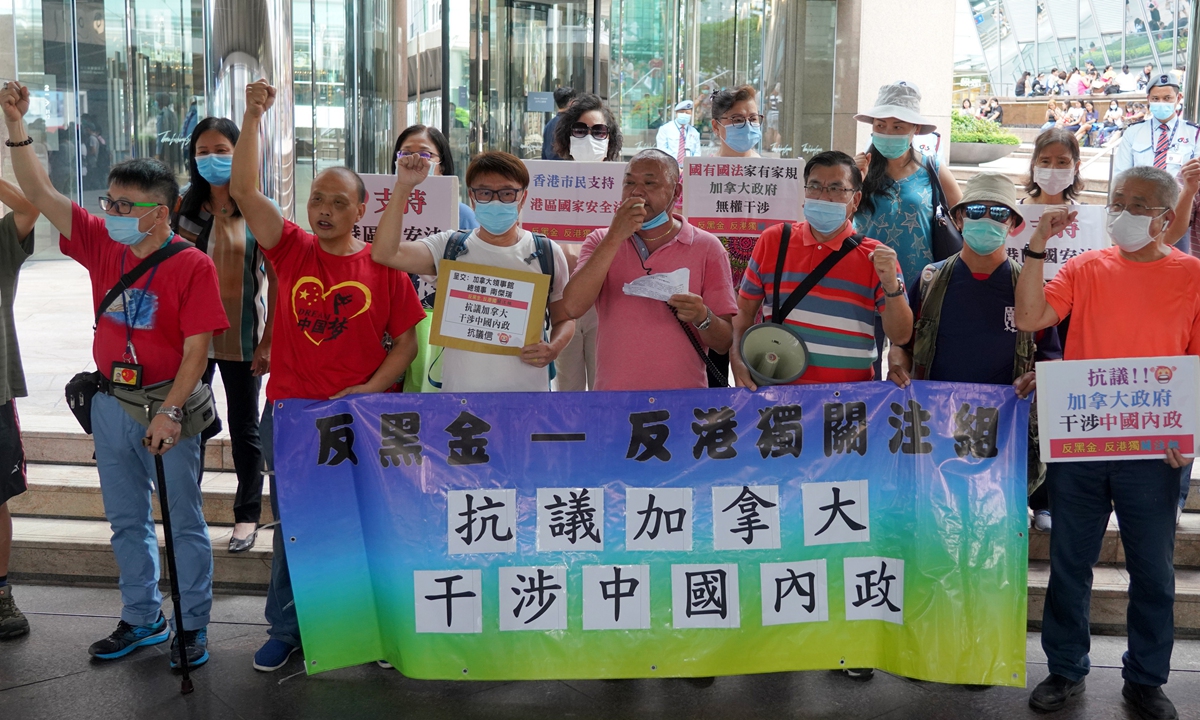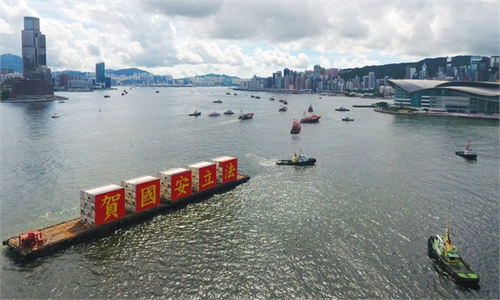China-Canada ties wane further as Ottawa becomes Washington's puppet over HK

Hong Kong social group members gather outside the Canadian consulate in Hong Kong to protest against the country's interference in China's internal affairs and show support for the National Security Law for Hong Kong on Sunday. Photo: cnsphoto
By restricting exports of military goods and suspending an extradition treaty, Canadian Prime Minister Justin Trudeau is in pole position in the circle of bootlickers pleasing the US regarding "sanctions" on Hong Kong, despite coming at the cost of destroying the bond with China, Canadian's second-largest trading partner and second-largest export market.
The Canadian move will have no substantial impact on China but only exposes that the country has become a puppet of the US in diplomacy, observers said.
Trudeau announced Friday a suspension of the extradition treaty with the Hong Kong Special Administration (HKSAR), ending judicial cooperation, and will no longer permit exports of sensitive military items to the city.
Following the UK, additional measures including those related to immigration are being considered by the Canadian side as well, media reported.
Canada lacks independence in its policy toward China and is full of bias on issues related to Hong Kong, but these actions will obviously not affect the implementation of the National Security Law for Hong Kong, Li Haidong, a professor at the Institute of International Relations of the China Foreign Affairs University, told the Global Times on Sunday.
In terms of bilateral relations, Li said Canada is extremely irresponsible, constantly creating new disputes and taking the initiative to undermine the already-tense relations.
Signs of warming relations soured again when a Canadian court ruled in May that the charges against Huawei Chief Financial Officer Meng Wanzhou satisfied the extradition requirement of "double criminality," meaning Meng is accused of the considered crime in Canada as well. Chinese officials and analysts believed the move showed that Canada has surrendered its legal and diplomatic independence to US bullying.
John Lee Ka-chiu, Hong Kong's Secretary for Security, slammed Canada on a local program on Saturday for having politics overriding the rule of law and neglecting its international responsibilities.
Wu Xinbo, dean of the Institute of International Studies at Fudan University in Shanghai, told the Global Times on Sunday that Canada's move has no substantial impact on China as its export value is low.
Canadian military exports to Hong Kong in 2018 were worth $20,000, mainly rubber bullets and rubber batons for police, Canadian media the Star reported Friday.
According to Wu, The Trudeau administration is bowing to the US and domestic opposition and therefore it is only a gesture over a hot topic that is none of their business.
The US and its allies have been actively meddling in Hong Kong affairs to make trouble for China.
US Senate on Thursday passed the Hong Kong Autonomy Act, aiming to penalize business and individuals who stand with Chinese central government and Hong Kong on the National Security Law.
British Prime Minister Boris Johnson recently announced the expansion of rights for holders of British National (Overseas) passports, which could offer Hong Kong protesters a route to British citizenship.
Australia, another member of the "Five Eyes" security grouping, said it was considering an offer of "safe haven" to Hong Kong protesters.
These countries have become "running dogs" of the US and joined the anti-China camp. They are showing their loyalty to the US by trampling on Hong Kong affairs, but their action will not impact China's firm attitude on safeguarding national security, analysts said.


